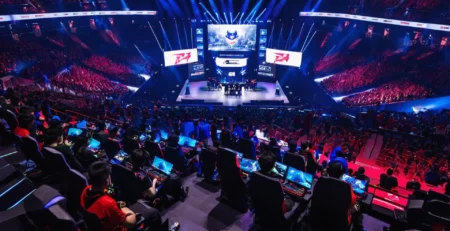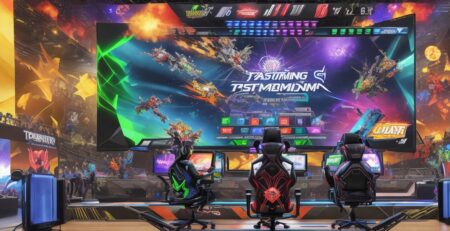The Effect of Gaming on Cognitive Skills: How Mental Capabilities Are Affected by Video Games
Overview of Gaming on Cognitive Skills
Video games are more than simply a way to pass the time in the modern era. They are now a topic of scientific inquiry, especially about their effects on cognitive abilities. This article examines how gaming affects cognitive processes and presents the most recent study findings.
1. Comprehending Cognitive Capabilities
Defined Cognitive Skills
The brain capacities known as cognitive skills allow people to learn, process information, and carry out tasks. These abilities include decision-making, problem-solving, memory, and focus. Comprehending these abilities facilitates evaluating the effects of gaming on cognitive processes.
Types of Cognitive Ability
- Memory: The capacity to retain and retrieve knowledge.
- Attention is the ability to concentrate on particular activities or stimuli.
- Problem-solving: The ability to resolve difficult situations.
- Making decisions: The act of selecting options depending on the facts.
2. Video Game Types and Their Impact on Cognitive Function
Action Video Games
Action games are recognized to have a substantial adverse influence on cognitive skills because of their fast-paced gameplay and demanding reflexes. Studies indicate that these games get better:
Action games improve visual attention by requiring players to respond rapidly and keep track of various items.
Hand-Eye Coordination: Motor abilities are enhanced when synchronizing physical motions with visual input.
Strategy Video Games
Real-time strategy (RTS) and turn-based strategy (TBS) games are examples of strategy games that test players’ ability to strategize and think critically. They improve:
Problem-Solving Skills: By requiring players to create and carry out plans, strategy games enhance their capacity for problem-solving.
Executive Function: Playing these games improves multitasking, organizing, and planning abilities.
Puzzle Video Games
Puzzle games, like Sudoku and crosswords, test players’ logical thinking abilities by presenting them with logical difficulties. Advantages include:
- Memory Improvement: Regular puzzle-solving helps improve working and short-term memory.
- Critical Thinking: Solving puzzles requires players to apply reasoning and logic.
3. The Scientific Proof: Studies on Video Games and Cognitive Abilities
Research on Action Video Games
Action games can enhance a variety of cognitive domains, according to recent studies:
- According to a 2014 study in Nature, people who play action games have better spatial abilities and process information more quickly than people who don’t.
- According to a 2015 Psychological Science study, action games can improve visual attention and memory by making neural networks more efficient.
Research on Strategy Games
Additionally connected to advances in cognition are strategy games:
- According to a study published in The Journal of Cognitive Neuroscience, older people’s executive functions and planning skills were enhanced by playing strategy games.
- Research published in Frontiers in Psychology shows that strategy games have improved problem-solving abilities and cognitive flexibility.
Research on Puzzle Games
- It is commonly known that puzzle games improve cognitive function.
- According to a Neuropsychology study, puzzle games have been shown to enhance older persons’ cognitive capacities, including memory and problem-solving skills.
- Cognitive psychology research revealed that solving puzzles may improve performance on logical thinking tasks.
4. How Playing Video Games Helps with Cognitive Skills
Improved Capabilities for Solving Issues
Gamers frequently have to solve complex problems when playing video games. This ongoing challenge improves their capacity for critical thought in practical settings and problem-solving abilities.
Enhanced Retention and Understanding
Character development and storyline-based games help players retain sequences and details, which helps them remember things better. Furthermore, instructional games can help acquire new knowledge and abilities.
Enhanced Focus and Attention
Action and strategy games need constant focus and attention. Regularly engaging in these activities can enhance players’ focus and capacity to block distractions.
5. The Possible Drawbacks and Difficulties
Addiction and Overstimulation
Even though playing video games might improve cognitive function, playing too much of it can overstimulate and become addictive. It’s critical to maintain equilibrium.
Possible Effect on Social Skills
Overcoming may lead to fewer in-person encounters, impacting relationships and social skills. Making sure that gaming doesn’t replace in-person social contact is crucial.
6. Suggestions for Moderate Gaming
Key to Moderation
Moderation is vital to maximizing gaming’s positive effects on cognition while reducing its adverse effects. Establishing time restrictions and maintaining a good balance between gaming and other pursuits is critical.
Selecting Appropriate Games
Select video games that test and involve your cognitive abilities. Games that teach concepts and demand strategic thinking can impact cognitive function more.
Including Social Gaming
Playing cooperative or multiplayer video games can improve social skills and collaboration while offering a well-rounded gaming experience.
In summary
Playing video games can positively affect cognitive capacities, including better problem-solving skills, memory, and higher attentiveness. It is crucial to approach gaming moderately and equitably to ensure the benefits surpass any potential drawbacks. By being aware of and using the cognitive benefits of gaming, people can use gaming as a kind of leisure to improve their mental capacities and general well-being.











Leave a Reply